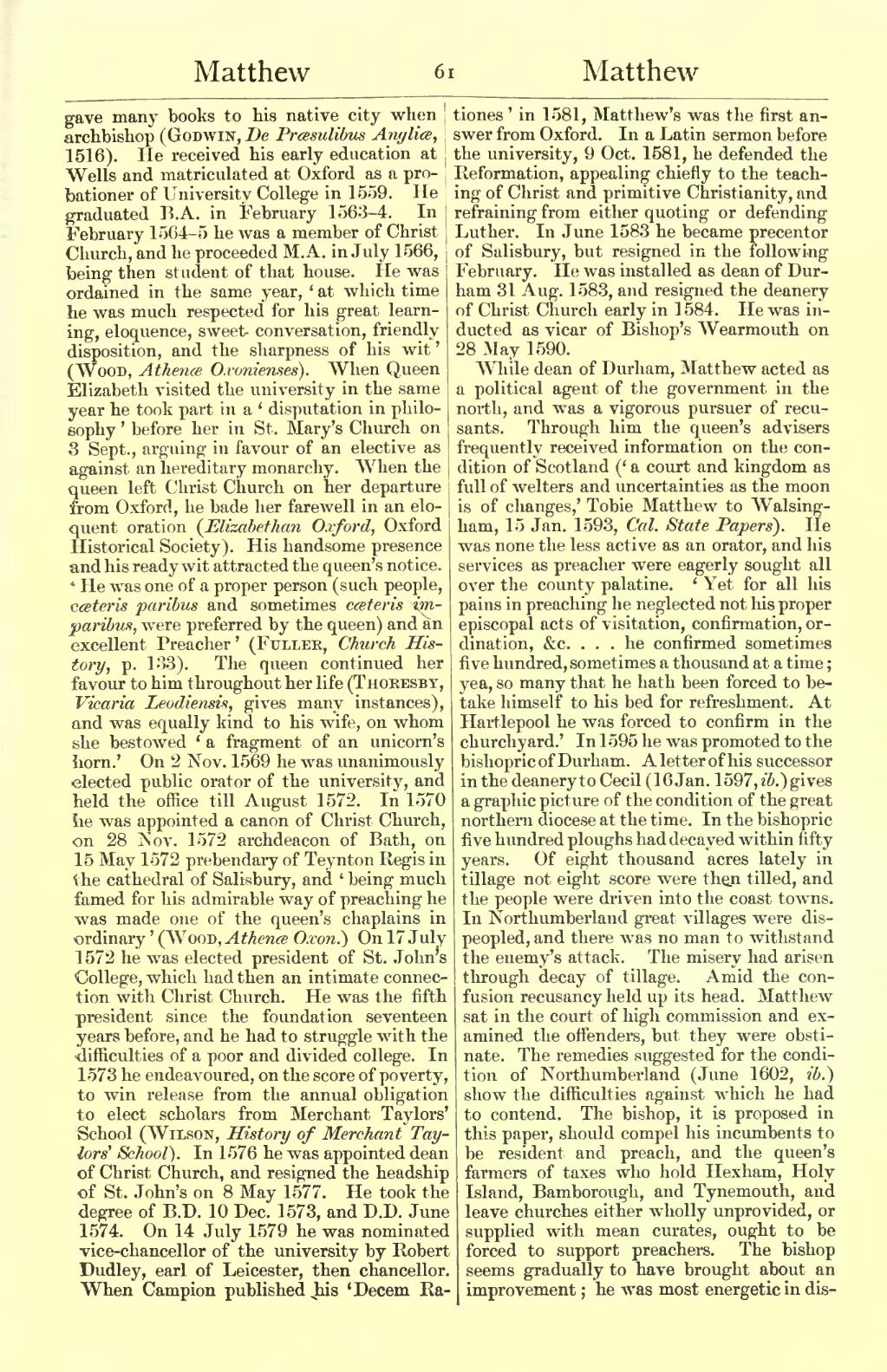and gave many books to his native city when archbishop (Godwin, De Præsulibus Angliæ, 1516). He received his early education at Wells and matriculated at Oxford as a probationer of University College in 1559. He graduated B.A. in February 1563–4. In February 1564–5 he was a member of Christ Church, and he proceeded M.A. in July 1566, being then student of that house. He was ordained in the same year, ‘at which time he was much respected for his great learning, eloquence, sweet conversation, friendly disposition, and the sharpness of his wit’ (Wood, Athenæ Oxonienses). When Queen Elizabeth visited the university in the same year he took part in a ‘disputation in philosophy’ before her in St. Mary's Church on 3 Sept., arguing in favour of an elective as against an hereditary monarchy. When the queen left Christ Church on her departure from Oxford, he bade her farewell in an eloquent oration (Elizabethan Oxford, Oxford Historical Society). His handsome presence and his ready wit attracted the queen's notice. ‘He was one of a proper person (such people, cæteris paribus and sometimes cæteris imparibus, were preferred by the queen) and an excellent Preacher’ (Fuller, Church History, p. 133). The queen continued her favour to him throughout her life (Thoresby, Vicaria Leodiensis, gives many instances), and was equally kind to his wife, on whom she bestowed ‘a fragment of an unicorn's horn.’ On 2 Nov. 1569 he was unanimously elected public orator of the university, and held the office till August 1572. In 1570 he was appointed a canon of Christ Church, on 28 Nov. 1572 archdeacon of Bath, on 15 May 1572 prebendary of Teynton Regis in the cathedral of Salisbury, and ‘being much famed for his admirable way of preaching he was made one of the queen's chaplains in ordinary’ (Wood, Athenæ Oxon.) On 17 July 1572 he was elected president of St. John's College, which had then an intimate connection with Christ Church. He was the fifth president since the foundation seventeen years before, and he had to struggle with the difficulties of a poor and divided college. In 1573 he endeavoured, on the score of poverty, to win release from the annual obligation to elect scholars from Merchant Taylors' School (Wilson, History of Merchant Taylors' School). In 1576 he was appointed dean of Christ Church, and resigned the headship of St. John's on 8 May 1577. He took the degree of B.D. 10 Dec. 1573, and D.D. June 1574. On 14 July 1579 he was nominated vice-chancellor of the university by Robert Dudley, earl of Leicester, then chancellor. When Campion published his ‘Decem Rationes’ in 1581, Matthew's was the first answer from Oxford. In a Latin sermon before the university, 9 Oct. 1581, he defended the Reformation, appealing chiefly to the teaching of Christ and primitive Christianity, and refraining from either quoting or defending Luther. In June 1583 he became precentor of Salisbury, but resigned in the following February. He was installed as dean of Durham 31 Aug. 1583, and resigned the deanery of Christ Church early in 1584. He was inducted as vicar of Bishop's Wearmouth on 28 May 1590.
While dean of Durham, Matthew acted as a political agent of the government in the north, and was a vigorous pursuer of recusants. Through him the queen's advisers frequently received information on the condition of Scotland (‘a court and kingdom as full of welters and uncertainties as the moon is of changes,’ Tobie Matthew to Walsingham, 15 Jan. 1593, Cal. State Papers). He was none the less active as an orator, and his services as preacher were eagerly sought all over the county palatine. ‘Yet for all his pains in preaching he neglected not his proper episcopal acts of visitation, confirmation, ordination, &c. … he confirmed sometimes five hundred, sometimes a thousand at a time; yea, so many that he hath been forced to betake himself to his bed for refreshment. At Hartlepool he was forced to confirm in the churchyard.’ In 1595 he was promoted to the bishopric of Durham. A letter of his successor in the deanery to Cecil (16 Jan. 1597, ib.) gives a graphic picture of the condition of the great northern diocese at the time. In the bishopric five hundred ploughs had decayed within fifty years. Of eight thousand acres lately in tillage not eight score were then tilled, and the people were driven into the coast towns. In Northumberland great villages were dispeopled, and there was no man to withstand the enemy's attack. The misery had arisen through decay of tillage. Amid the confusion recusancy held up its head. Matthew sat in the court of high commission and examined the offenders, but they were obstinate. The remedies suggested for the condition of Northumberland (June 1602, ib.) show the difficulties against which he had to contend. The bishop, it is proposed in this paper, should compel his incumbents to be resident and preach, and the queen's farmers of taxes who hold Hexham, Holy Island, Bamborough, and Tynemouth, and leave churches either wholly unprovided, or supplied with mean curates, ought to be forced to support preachers. The bishop seems gradually to have brought about an improvement; he was most energetic in dis-
